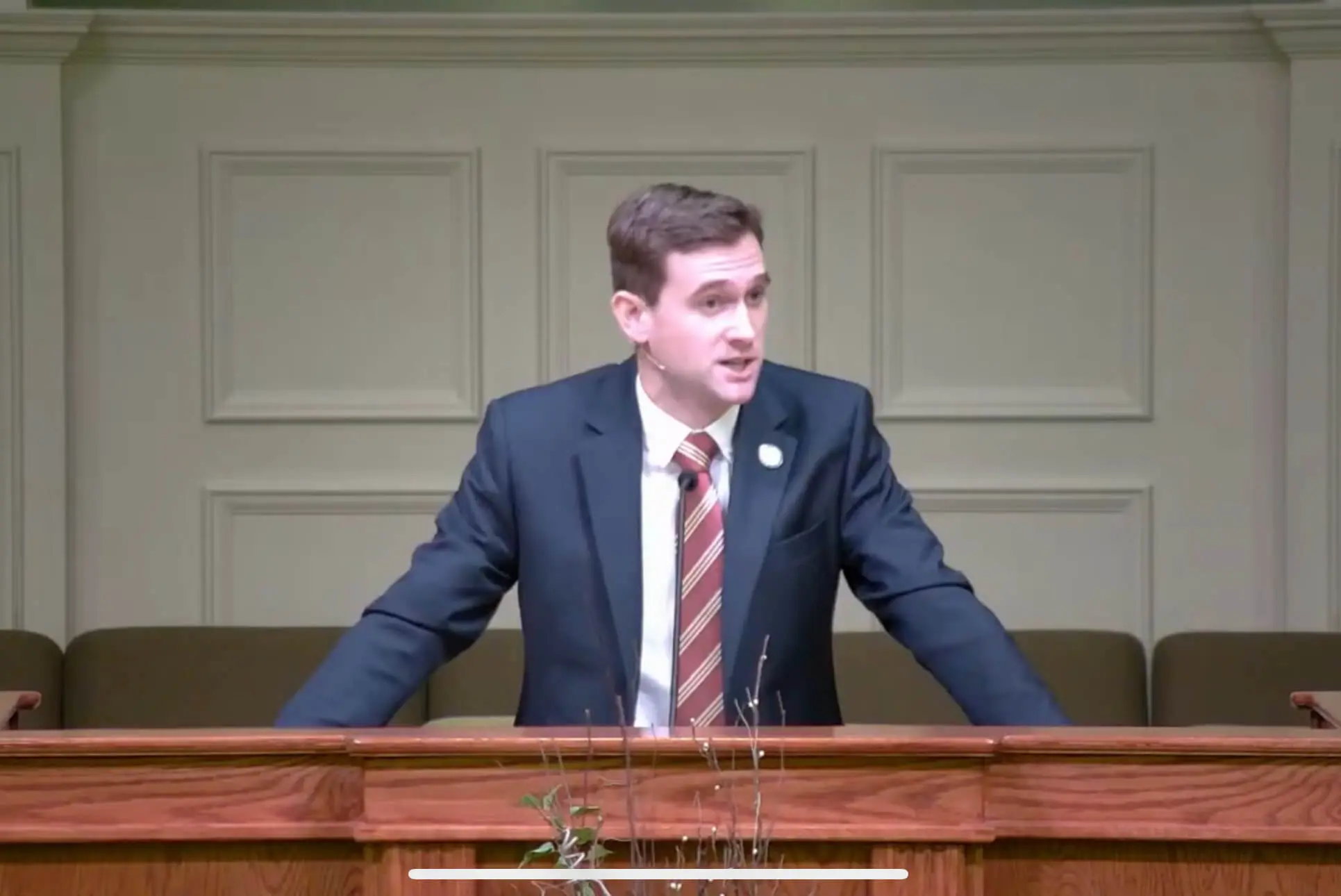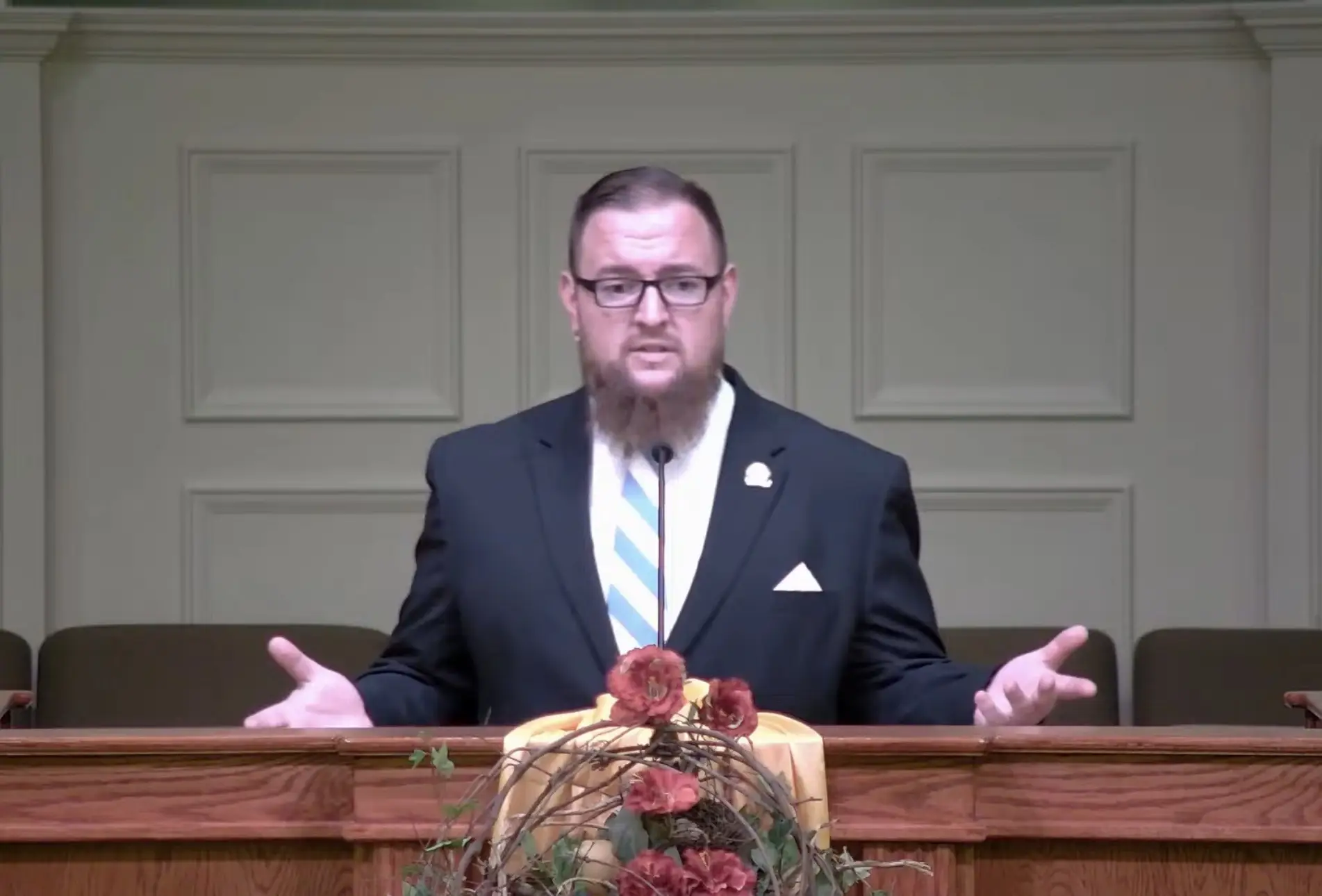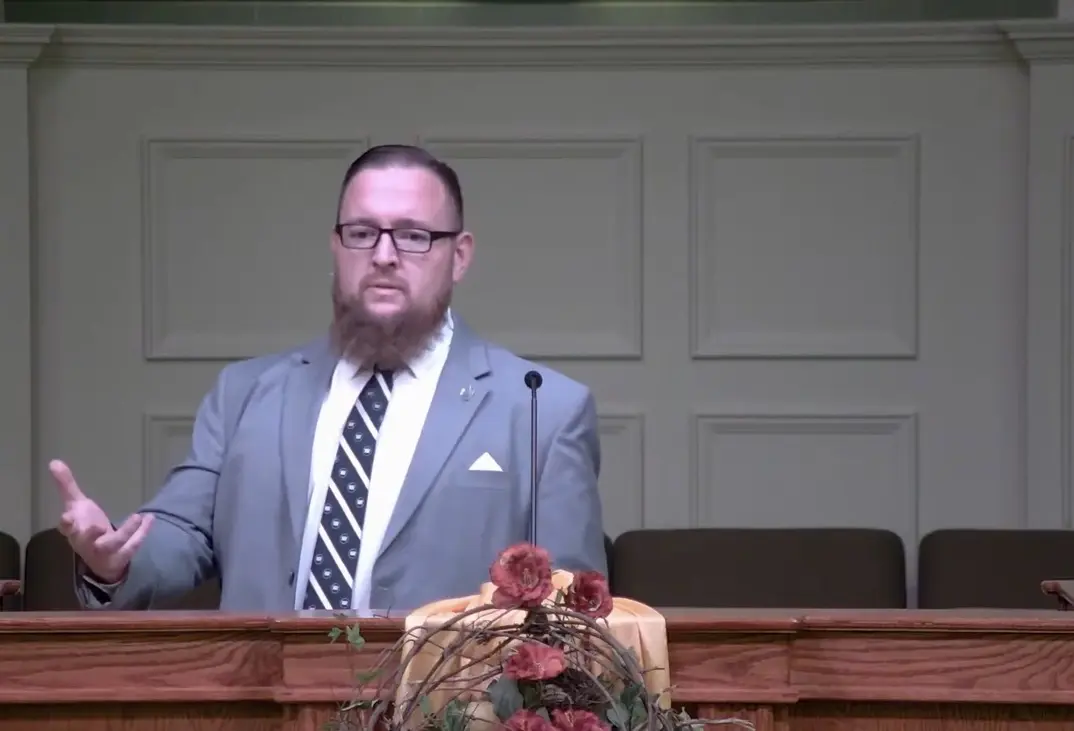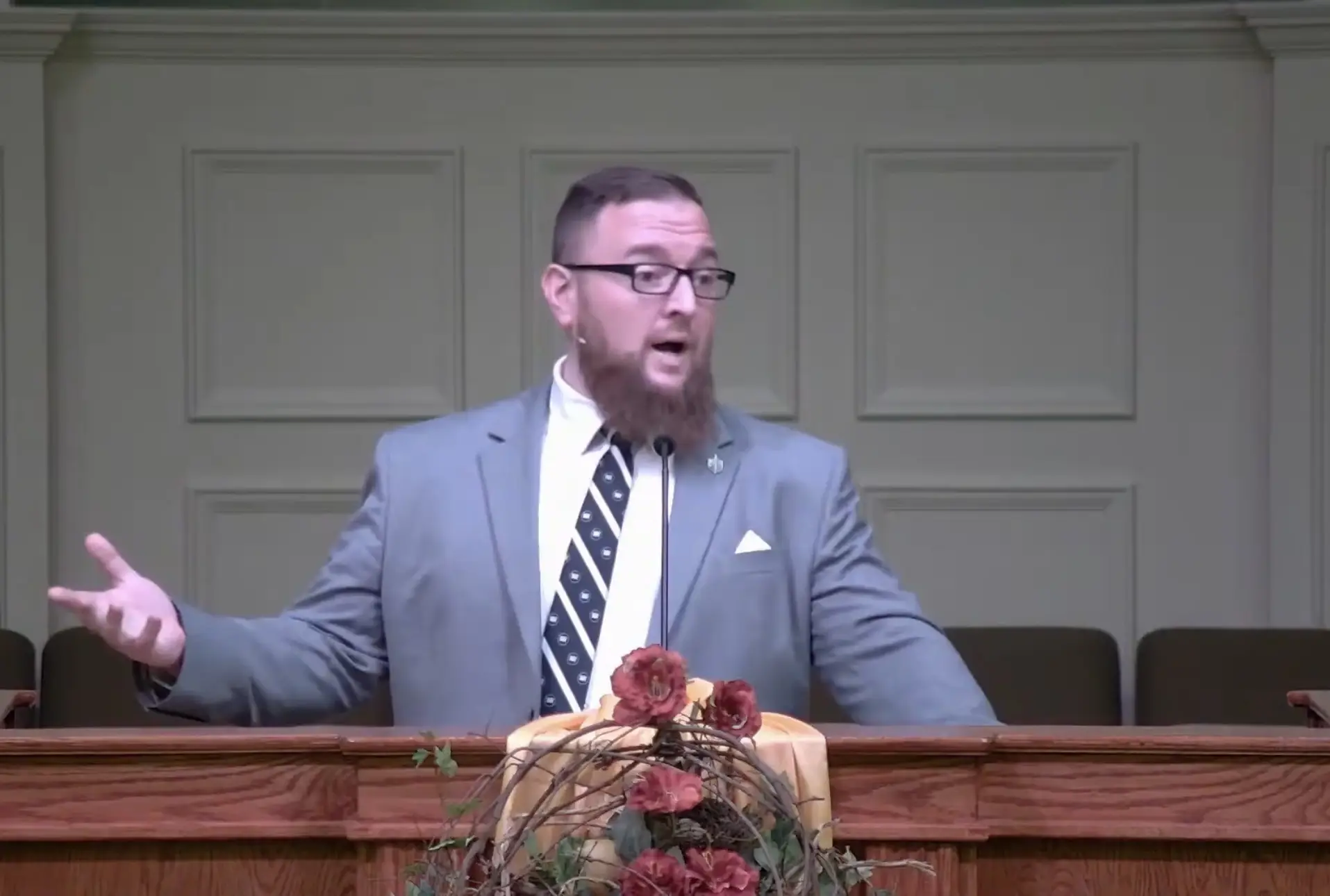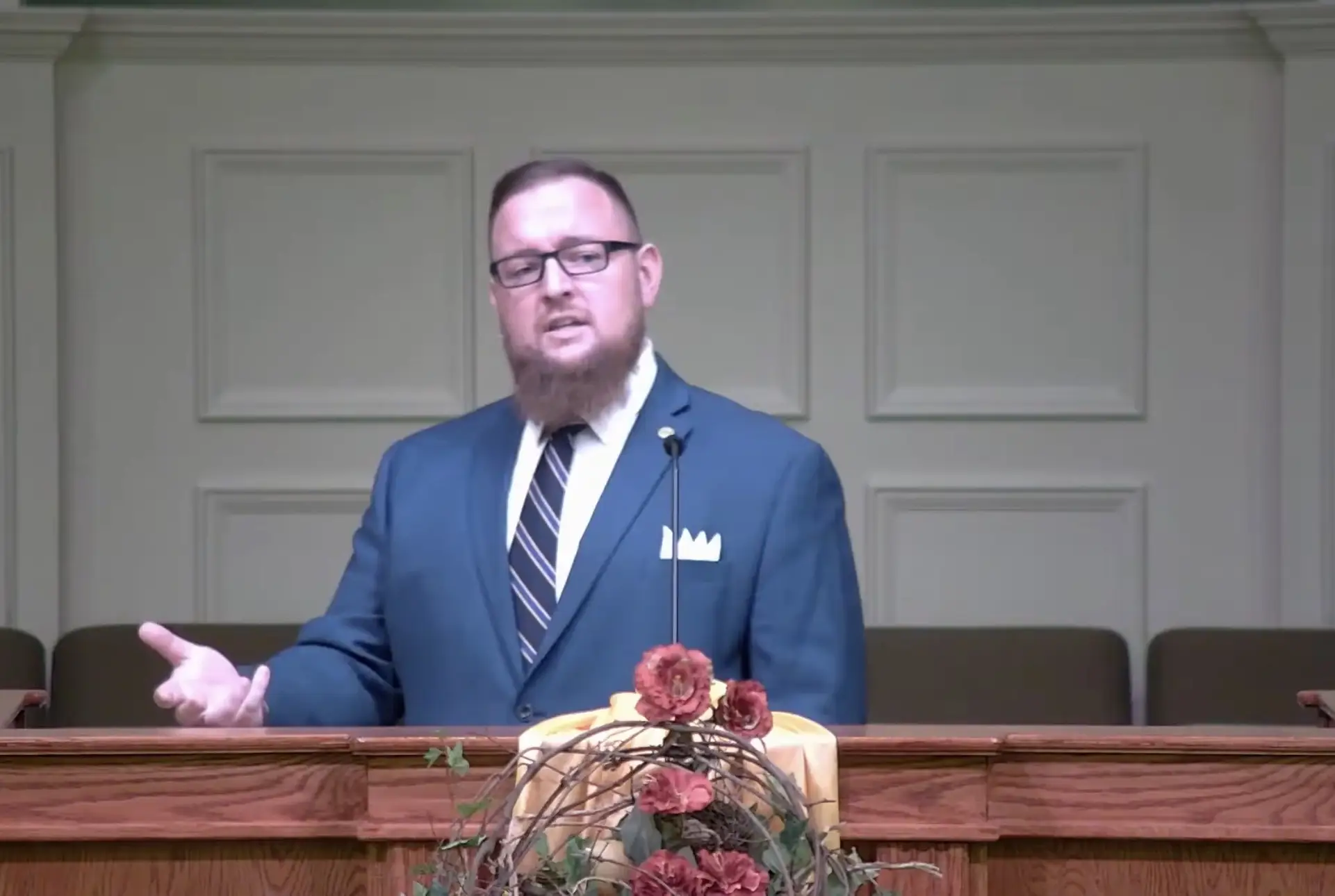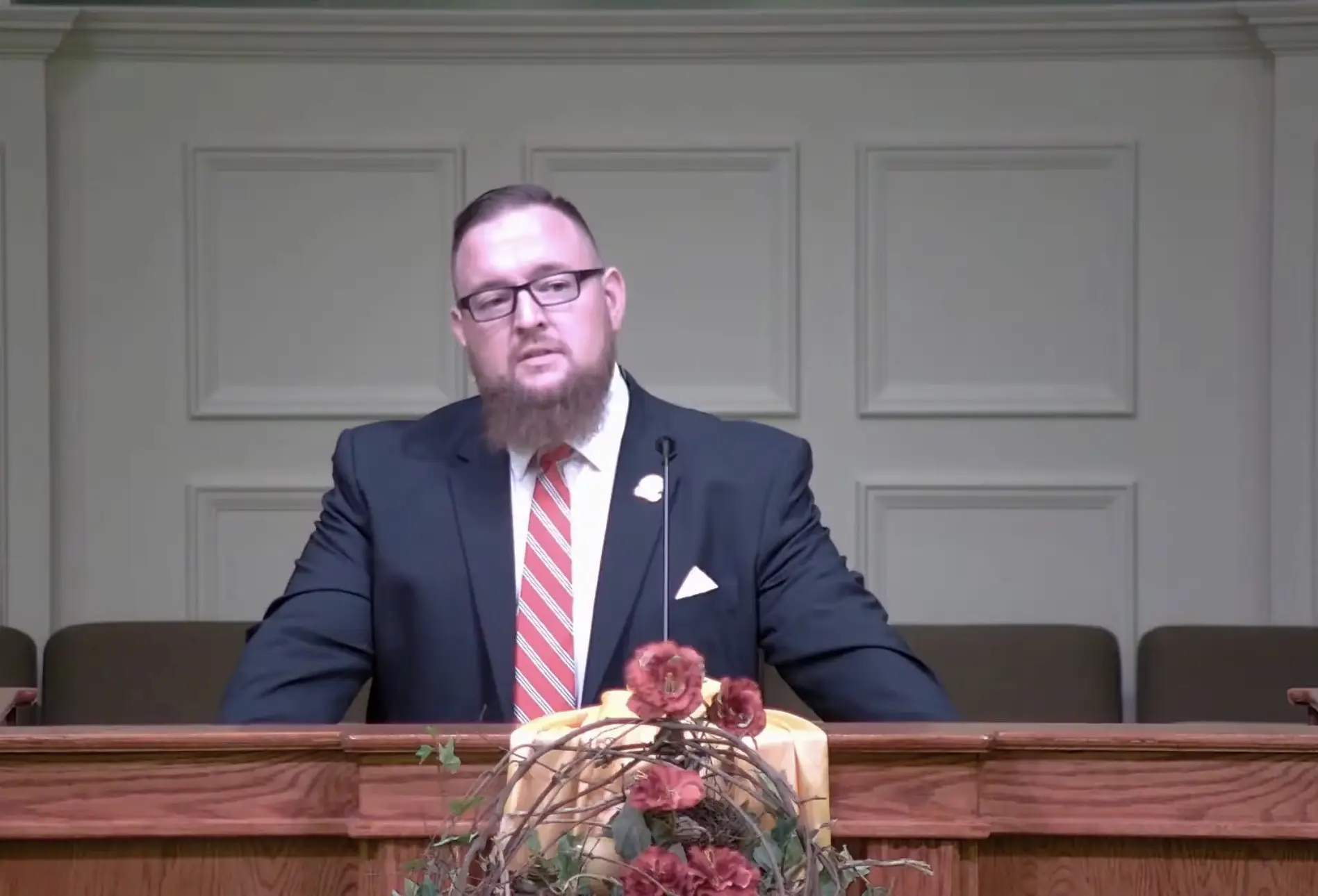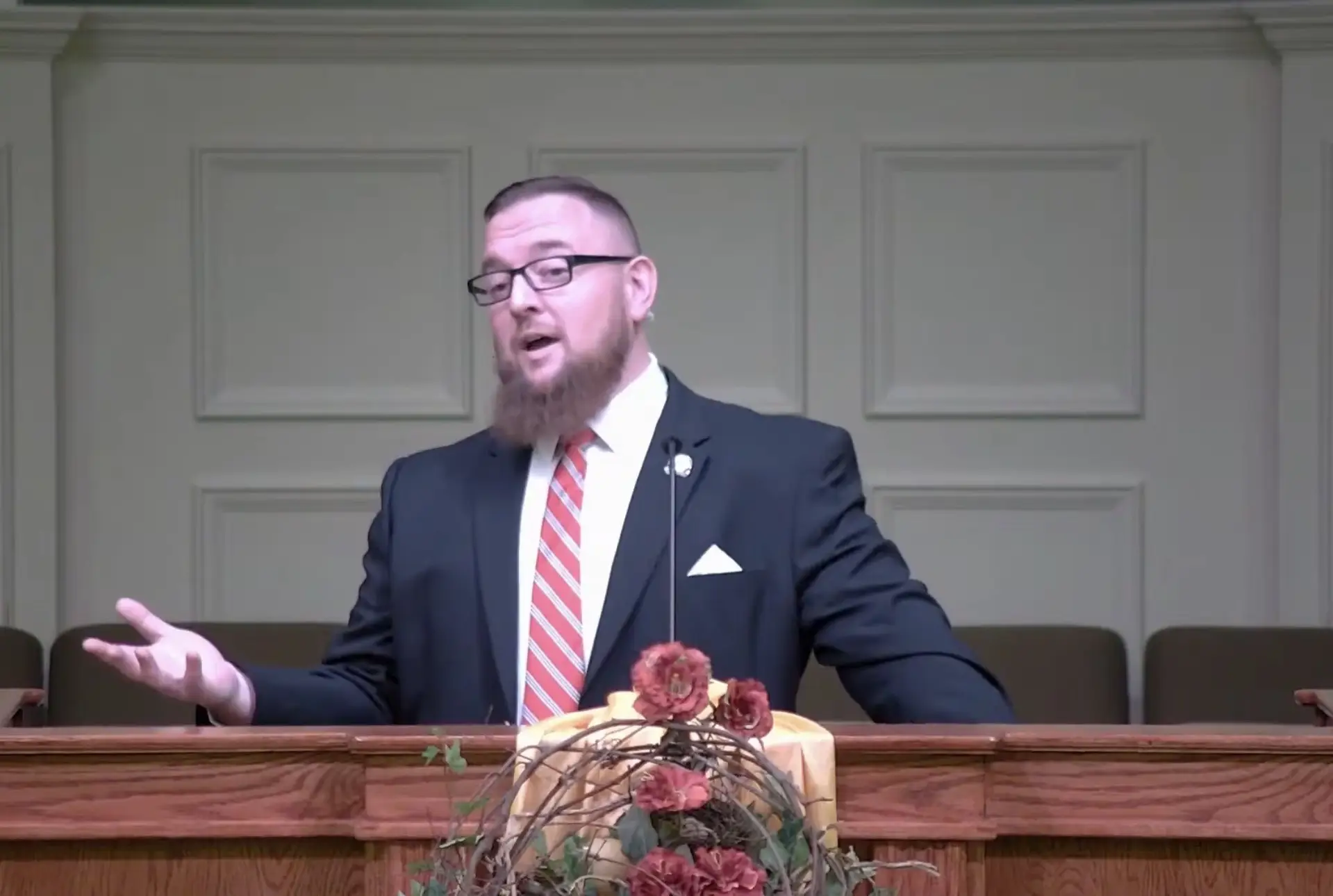Video
“Christ Alone”
Galatians 3:1-6
Stephen Kretzer
01/19/25
Audio
Transcript
Well, good morning. I am so excited to be here today. I want to extend thank you to the elders and deacons, and to you as a church, too, for inviting us to come down. As Pastor Ryan said, this is the very church I grew up in. This very stage was the church I got married in, to that beautiful lady who played the offitory for you. And I’m excited to meet new people, too. So, if you don’t know me, after the service, come find me and talk to me. I look forward to meeting you all.
Our passage this morning, like Pastor Ryan read, is Galatians 3, chapter 3, verses 1 through 6. So if you have your Bible, I invite you to open it up. I’m excited to dive into God’s holy, inspired, and inerrant word. It is a privilege and an honor to be up here. I’m excited to be up here, and I’m excited to preach from this chapter. But before I begin, I want to go to the Lord in prayer.
So would you pray with me? Heavenly Father, I wanna thank you for today. I wanna thank you for the freedoms we have in this country, the freedom to stand up here and publicly proclaim the truths of your word. We thank you for those freedoms, but we also pray that you also give us the courage to continue doing that no matter what may come in the form of persecution. I pray that the spirit works here today in this building. The spirit will speak through me as I preach and will work in people’s hearts, and they’ll receive the word from your word. In Jesus’ name, amen.
Many of us, I’m sure, are familiar with the term fundamentalism, or fundamentalists, and usually, oftentimes, that when we use that word, it’s not always in the best light, it’s not always in a positive connotation. But what’s interesting is when you trace the origins of fundamentalism, it goes back to the early 1900s, about the 1920s, and it started out, actually, as a really good movement. In the early 1900s, is when theological liberalism began to arise in the West. So people started denying the truth of God’s word. So only certain parts of the Bible are true, other parts are not. They started to deny the incarnation, certain miracles.
So theological liberalism was denying the truths of God’s word. And what happened is you had a group of men, some presidents of seminaries, some pastors, some theologians, come together and write a series of letters that became called the Fundamentals of the Faith, where they said, hey, all of God’s word is true. The incarnation is true. All the miracles are true. You can’t take away any of this. It’s all true. And that’s where the term fundamentalism came. And it started as a good movement. But unfortunately, what happened over time is that fundamentalism and fundamentalists got to the point where the gospel and grace and Christ alone were not enough for them. There had to be some more rules added in. They said, we preach Christ, we teach Christ, but we need to make other rules to put in place to help prop Christ up, so to speak.
Some examples are some churches where that are, we refer to as KJV only, where they say in their statements of faith, we believe the holy inspired word of God is handed down to us in the King James Version only. And some will say, if you’re a Christian, this is the version you use. Some will say, if you’re a Christian and the Christian faith, you have to dress this way, you have to speak this way. And the problem is it became, you have to do these things. If you are a true believer in Christ, you have to do these things. So it became Christ and these other things. And it wasn’t just Christ alone.
And when we come to this passage today, this is what Paul is talking about in Galatians. This is what he’s telling the Galatians they’re doing. It’s legalism. The Galatians were practicing legalism. Christ and these other things. And when we come to this passage, it teaches us that Christians are to keep trusting in Christ’s work and not their own works for salvation. Before I get into even verse one, though, I want to go over some brief context, starting in just chapter one. In the first two chapters of this book, Paul presents his issue with the Galatians. They have been turned to another gospel by the Judaizers. They heard the gospel. They heard the gospel, the message of Christ, and they believed it, but they have been turned away from it.
These Judaizers were preaching that they had to follow the Old Testament law on top of Christ. Christ and other things. And as you continue to read Galatians in chapters 4 and 5, you actually see that the Galatians were observing Old Testament festivals and circumcision. And they were saying, we have to do these things. They had become legalistic. Paul explains the importance of not listening to any other gospel that was preached.
Galatians 1.10 says, for, this is Paul speaking, for am I now seeking the favor of men or of God? Or am I striving to please men? If I were still trying to please men, I would not be a bondservant of Christ. And he goes on to say, my message was from God, not from men. If any other person or angel brings a message contrary to what we preach to you, it’s not true. And that’s what these Judaizers are doing. They’re preaching another gospel. And Paul explains that his message can be trusted because it is from God. And through the rest of chapter one through chapter two, verse 10, he’s essentially listing his credentials. His message is from God. He’s saying, you can trust my message. This is the true message.
And in chapter two, verses 11 through 21, it’s interesting what Paul does. He shifts to the example of the apostle Peter. And what he does when he shifts to Peter is he’s showing, hey, this is what Peter did, and what Peter did is what you’re doing now. Peter was eating with the Gentiles probably what he wanted to eat. And in Acts 10 and 11, when we go back and read those, that was where God showed to him, hey, we’re not bound by those food laws anymore in the Old Testament. You’re not bound by that. You can eat what you want. You’re allowed that Christian liberty. So he knew that he was not bound by the food laws.
What happened is some Judaizers and some Jews came in, and in his fear of what these Judaizers might think of him, he began to eat only with the Jews and not the Gentiles. He isolated himself. It may have been because the Jews did not want him to eat with the Gentiles, or it may have been because of what he was eating. And Paul is rebuking him, and he rebuked him. And by telling the Galatians this story, he’s rebuking them, essentially. He’s saying, hey, Peter did this, you’re doing the same thing. So even before he gets to, oh, foolish Galatians, he’s showing them, you’re wrong. And verses 15 through 21 of chapter 2 is when Paul really gets into his theological argument, and that’s where he starts to lay the foundation of it. Faith in Christ is what saves us and not the works of the law. The works of the law refer to the things in it, the different laws, and it’s what’s prescribed in the law. And following them in the way that the Galatians were doing, making them a part of salvation, is legalism.
In verses 15 through 21 is where he first references that we are justified by God through faith in Christ, declared righteous. It’s a legal term. It means we can stand before God as righteous. And this theme will actually continue on through our passage today. So as a reminder, this passage teaches Christians that we are to keep trusting in Christ’s work and not our own works for salvation. And that brings us to verse, our passage today. I’ve split the sermon, the six verses, into two themes. The first theme is don’t forget. Covers verses one and two and five and six.
I’m gonna read those verses very briefly. Verse one, and listen to the words he uses. Listen to what he says. And the first five verses are five questions, five rhetorical questions, and they serve a purpose. They serve a purpose. The answer is supposed to be in the question. Paul is asking them these questions to get them to realize, hey, you’re doing wrong. If they’re reading these questions out loud, they should realize, like, I’m wrong. So listen to how Paul does it, starting in verse one. You foolish Galatians, who has bewitched you before who eyes Jesus Christ was publicly portrayed as crucified? This is the only thing I want to find out from you. Did you receive the spirit by the works of the law or by hearing with faith? Going to verse five. So then, does he who provides you with the spirit and works miracles among you do it by the works of the law or by hearing with faith? Verse six. Even so, Abraham believed God and it was reckoned to him as righteousness.
Like I said, these are rhetorical questions that he wants them, he’s using them to get them to realize what they’re doing is wrong. And Paul doesn’t hold back, he uses the word foolish. And that’s not a light term, that’s not a flippant term, that’s a serious term. In the Old Testament, it was used for those who were stupid, unintelligent, and unwise. In the New Testament, we see it used for those who are living life apart from Christ. And he uses it intentionally. It’s a word you don’t want to be called. But he’s making a point, he’s trying to show how ridiculous it is what they are doing. How ridiculous it is they’ve reverted back. He’s not saying they’re not Christians, but he uses the word foolish to show them you’re acting like those who aren’t Christians. And he wants them to realize how foolish they are. They’re turning from the faith. They heard proclaimed to them. And he tells them they’ve been misled. He wants them, don’t forget how you heard the gospel.
Verse one, it says, who has bewitched you before whose eyes Jesus Christ was publicly portrayed as crucified? Christ was publicly proclaimed to them. Paul publicly proclaimed it to them. Paul shared the gospel with them on what was probably his first missionary journey that we read about in Acts 13 and 14. He went to, now Galatia was a region with different cities in it, so he went to the region of Galatia. And he preached the gospel to these individuals. They heard it from his mouth. And the letter from the Jerusalem Council in Acts 15, where they say that new believers, specifically the Gentiles, are not to be burdened with the rules and laws, Paul took that letter. He was the one who took it to these cities, to the region of Galatia. And you see that Paul is annoyed, he’s frustrated, but he’s also hurting. He’s hurting because these people he witnessed to, these people he helped, he led to the Lord. These people who he prays for. When you read Paul, Paul is the prayer warrior.
In one of my classes right now, I’m working through 1st and 2nd Thessalonians, and you see in all his letters, he’s constantly praying. He’s constantly encouraging. So you know he prayed for these people. You know he loved them. So he’s hurting. I’m sure many of us can think of individuals we know who for many years we thought were believers. And we see them backsliding or showing evidence that they aren’t saved. So Paul is hurting. He’s burdened. And his next question in verse 2 is to remind them how they receive the Holy Spirit. Don’t forget how you receive the Spirit. It was hearing with faith. What does Romans 10, 17 say? Faith comes by hearing and hearing by the Word of God.
That’s one thing we believe here at this church. The gospel comes through hearing, through knowledge that you are a sinner and you need Christ. You have to understand that. And he publicly proclaimed that to them. So he wants them to know it wasn’t because of rules. It wasn’t because of circumcision. It wasn’t because of following the festivals. It was hearing with faith that the Holy Spirit came as a gift from God. He wants them to see that works do nothing. And as we move to verse five, we see the subject actually shift to God. And when they read this question, they should realize, oh, it’s hearing with faith, not the works of the law. It’s given through faith. God, by what does God supply the Spirit? It’s given through faith. And it’s not in faith what they do, but faith in what Christ did.
We sang the song, Christ Alone. It’s a beautiful song. It’s Christ alone in Christ’s work. It’s not in our own works because it’s not enough. It’ll never be enough. And that’s what he’s saying. And verse six is an interesting one because it’s the only one that doesn’t have a question. Even so, and I’ll start, I’ll read in verse five again. It says, so then does he who provides you with the Spirit and works miracles among you do it by works of the law or by hearing with faith? So he ends with, or by hearing with faith, that question. And verse six, even so Abraham believed God and it was reckoned to him as righteousness.
Some translations may say credited, credited, reckoned. There’s translation differences on that. But, and it’s interesting because it’s the only one that doesn’t have a question. And I think in a sense it could almost be served as a summary of what Paul has tried to already state. But he brings in Abraham, Paul brings in Abraham, to show that he believed in God, and that is how he was made through righteous. That’s how he was made, that’s how he was declared righteous, and not through his works. Don’t forget, he’s telling him, don’t forget how Abraham was made righteous.
Now he quotes in verse six from Genesis 15, six, which is when God first gives the promise of making a great nation out of Abraham. And Abraham believed the promises of God. He went to where God told him to go. He believed. And when we read the text, it almost seems immediate. It was immediate belief. I think he also brings in Abraham because these Galatians would have most likely known about him, even from him talking to them when he came and preached. Abraham was someone who would have come up a lot.
Tom Schreiner, who is a New Testament scholar, who is actually a professor at Southern, argues that the Judaizers were maybe using Abraham as a justification for following something like circumcision. So they were saying, hey, this Abraham you’ve heard of, the great father, the great Abraham, he circumcised his son. You need to do this. titling the Galatians, you have to do this. And Paul is actually, it’s funny, they’re using Abraham in a wrong way, in the incorrect way, Paul is using it in the correct way, and he’s using Abraham as a coarse correction of sorts. He’s like, hey, that wasn’t how Abraham was declared righteous, that wasn’t how he was saved, it was because of his faith, not because of what he did.
And when you look at Abraham’s life, you see a lot of areas where he messed up. Two instances where he lied about his wife. It was because of faith, because of God’s love for him and giving him that faith. And this verse, verse six, leaks back to Paul’s argument that he started in verses 15 through 21. And when we come to verse six, we realize and we see that we’re dealing with the imputation of Christ’s righteousness to ruin sinners. Being a good seminary student, I like big theological terms. If you ever come across a seminary student, he’ll always use theological terms, even if he doesn’t know what they mean. Thankfully, I do know what this one means, but imputation deals with the righteousness of Christ being given to us, being given to sinners, and the sins of those who are his, of the elect, being transferred to him while he was on the cross.
My wife has recently found this amazing device that my dad showed her. It’s called a meat injector. And honestly, I could make this an infomercial, but I’m not going to, but if you have dry meat, this meat injector, essentially what you do is you put this, she told me what it is, it’s like meat juice or something, I don’t know, like marinates it and makes it juicy, but you put it in this, it looks like a syringe in a shot, and you stick it in the meat, and you just inject the juice into it. And that reminds me of imputation, because we do nothing. We’re declared righteous, it’s given to us. In fact, if we look at verse six, it says, Abraham believed God and it was credited to him as righteousness. That’s passive. It means God, it means Abraham didn’t do anything on his own to receive, he didn’t do any works to receive the righteousness. God freely gave it to him. This righteousness is reckoned, or as some translations say, credited to us. It is not of us.
And in fact, Isaiah 53:11 prophesied this. As a result of the anguish of his soul, he will see it and be satisfied. By his knowledge, the righteous one, my servant, Jesus, will justify the many, as he will bear their inequities. And we’re justified, we’re declared righteous. So the imputation of Christ’s righteousness to ruin sinners is a beautiful, beautiful doctrine and a beautiful teaching. A teaching this church holds to and must because it is the only way we can be declared righteous. It’s Christ’s work that allows us to stand before God righteous. When you die and you go to God and you go to heaven and you’re saved, you can stand before him declared righteous because of Christ’s work.
Paul wants the Galatians to continue trusting in Christ’s work and not their own works. It is only by faith given by Christ that they will be declared righteous. And as we look at these few verses, we have to think, are we foolish and have we forgotten how we are saved? We are not supposed to forget. Some of us have been saved in here maybe a few years. Some of us have been saved in here many years. But let us not fall into the trap of thinking that we are better than the Galatians. that we are better than many of the people that Paul wrote to.
And if you are not saved, if you are here today and you’re not saved, you must confess your sins and believe that Jesus Christ is your Lord and your Savior. He’s not one or the other, He’s your Lord and your Savior, and it’s important we recognize both. He saves you and He’s your Lord. Give your life to Him. It’s the most important decision in life, and it is not by works. I love looking at the back wall there and seeing the solas. Because they’re a great summary of salvation. We’re saved by grace alone, through faith alone, in Christ alone, according to the scriptures alone, to the glory of God alone. It hits it all. I love them because they summarize it so well. And what you find in all five of them is it has nothing to do with you, nothing what you can do. Only Christ can save us and give us true lasting peace, because when you try to save yourself and live your life on your own, you may say you have peace, But you don’t have the true lasting peace that only Christ can give. The peace that stays with you in the hardest times of life. That’s the peace that only Christ can give. And once we are saved, we are kept in the Father’s hand forever. Nothing can separate us from his love. And that’s an encouraging thing to know as well.
It’s also important to remember, don’t forget what we’ve been saved from. We were slaves to sin. Everyone who’s born on the planet has fallen short of the glory of God. We are born into this world sinners, and you are a slave to sin, destined for eternal conscious torment in hell. But because of Christ’s work, we are saved from it. And that is something worth saying every day for the rest of your life, thank you for, if you have been saved. And since, if you have been declared righteous, it’s important to continue pursuing righteousness.
The Christian life doesn’t stop when you become saved. It’s not as if your life does change, but it’s not as if you’re perfectly good. You’re alright, you don’t have to try to be godly anymore. Christian life is a daily battle, it’s a daily walk. We must pursue righteousness, which means we must pursue after God. We must seek to continue to know Him more and more every day. Later in Galatians, actually in chapter five, we read about the fruits of the Spirit. Seek to exhibit the fruits of the Spirit to one another. Those who seek after God will find God. If you are saved and seeking to follow God, He will draw you closer and closer to Him. So thank God for your salvation from sin. And when we remember that salvation is by faith in Christ, then that’s what saved us. We will not rely and trust in our own works for continual salvation. Which brings me to my second theme, don’t be foolish, which covers verses three and four. I’m gonna read those very briefly.
Verse three. Are you so foolish having begun by the Spirit? Are you now being perfected by the flesh? Did you suffer so many things in vain? If indeed it was in vain, Paul is condemning them for going back to the law even though they have been saved apart from it. Because when he preached the gospel to them, he didn’t talk about the works of the law. He didn’t say you had to do this. In fact, instead of contending for their faith, they’re conceding the faith for the faith. In Jude 3, The author Jude writes, Beloved, while I was making every effort to write to you about our common salvation, I felt the necessity to write to you appealing that you contend earnestly for the faith which was once for all handed down to the saints. Jude was writing to a church that was facing some false teachers, some false prophets, and telling them to contend for the faith.
The Galatians are dealing with these Judaizers, these false teachers and false prophets, but they’re not contending, they’re conceding. In a war, in a battle line, you have two armies. And if one army is giving up ground, that’s not a good sign. And the Galatians are giving up ground. And Paul is telling them, you cannot do that. Contend. Salvation is not Christ and this other thing. That’s what legalism says. That’s what fundamentalism said at some point. It’s Christ and this other thing. We need Christ and we need this. Instead of grace alone and Christ alone, it’s grace alone, Christ alone, and this. And Paul’s saying, no, that’s not what it is. That’s not what you heard from me. They’re essentially saying that Christ is not enough for salvation. Even if with their words, that’s what they’re saying, by their actions, that’s not what they’re saying.
So Christ is not enough, so we need to add these other things. Salvation is Christ in Christ alone. One commentator note, they are now placing their trust and confidence in fleshly means. I think that’s a good way to think about it. Fleshly means, things that we can do. Their faith and trust is what they and what they can do, what they can control. They were being led astray, and Paul wants them to see how ridiculous it is that even though they have the Spirit, even though they have the Holy Spirit, they are trying to be perfected by the flesh. They have the Holy Spirit. They have the one who will continue to sanctify them, who will continue to work inside them, making them more in the image of Christ, and yet they’re forgetting about that, or they’re ignoring it. And they’re trying to be sanctified by their own means. The Holy Spirit is the one who sanctifies and causes us to grow in maturity.
In 1 Peter 1-2, Peter writes, Peter, an apostle of Jesus Christ to those who reside as aliens scattered throughout Pontus, Galatia, Cappadocia, Asia, and Bithynia, who are chosen according to the foreknowledge of God the Father by the sanctifying work of the Spirit to obey Jesus Christ and be sprinkled by his blood. It’s the sanctification, the progressive sanctification of the Holy Spirit that allows us to grow. Not fleshly means. Yeah, I can almost picture him grabbing him by the collar. Like I said, he’s annoyed, he’s frustrated, but he’s hurting too. He wants them to do right. They are trusting in something else. And verse four is powerful. It introduces an interesting thought. Did you suffer so many things in vain, if indeed it was in vain? If they suffered for the gospel, but are no longer holding on to that gospel. What was the purpose of their suffering? Some commentators think that after the Galatians came to know Christ, they may have experienced some form of persecution, whatever that might be. But it seems that due to what he’s saying here, they did suffer for their faith. So Paul’s saying, hey, you came to know Christ. You suffered for your faith, as Christians do. But now you are reverting back. So is your suffering in vain? What was the purpose of your suffering? It was pointless.
I’m a World War II buff. I love history. And when you study World War II, and you study specifically what happened in the Pacific theater of the war, you sometimes come across a Japanese intelligence officer named Hiro Unada. And Hiro Unada was stationed on the island of the Philippines in 1944, right before the Allies came and took it. And his mission was pretty simple. It was to fight the native Philippines, fight the Americans, whatever the cost, live off the land, kill as many of them as you can, and don’t stop fighting. It doesn’t matter if it takes you one year, five years, keep fighting. Don’t ever give up. Well, he did a great job at that, because from 1944 to 1974, he stayed at his post and did his job. But what’s interesting is that World War II ended August of 1945. So many years after the war ended, he continued his mission. In fact, he’s credited with 30 civilian kills because of what he was indoctrinated by. And it was all pointless.
And I think that helps us understand a bit what Paul’s trying to say here. Like, if you suffered for your faith, but now you’re doing something else that’s actually not of the Christian faith, it’s pointless. What’s the point of your suffering? Why did you suffer? Paul’s urging them to run back to truth and not trust in their own works. I mean, Paul was, what did he call himself? A chief among sinners. Paul drug Christians away. He was, by Judaizer standards, a great guy. So he, in some ways, can maybe empathize with them. He can think, like, I know what this is like. I know what it is to believe this and practice it and live it out. I know what it’s like to have that emptiness inside you every day. And Christians are not to be foolish either. Only Christ can save and nothing else. I’ve said that over and over again, but it’s important and we always need to remember it. It’s foolish to know truth and what is right and then run to something else. That’s what the Galatians were doing.
If you know Christ, adding works or rules won’t keep you in Christ. It’s not a certain amount of church services. It’s not a certain haircut. It’s not a certain Bible version. Not a certain outfit. Not certain movies, music, movies, or book. Not giving to charity or even opening doors for people. For me as a student at the Southern Baptist Seminary, I have a lot of books I have to read. In fact, this next semester I have about 22 books I have to read. So I’ve got my work cut out for me. But for us as seminary students, it can be easy to get to the point where it’s like, I’m reading this great book. And we have a lot of great books. I’m growing. But like, is this book becoming my Bible? Like, is this book that I’m, this is my gauge by my holiness, by my walk with the Lord? Because I’m reading this book? Is reading this book keeping me close to God? Is this what is saving me? For students, which applies to me and even Pastor Ryan as well, it’s not about grades.
Now I will say, I’m not saying you shouldn’t care about your grades. We should work hard in school and do well, grades are a reflection of that. But if Pastor Ryan and I are making a grade the source of our happiness, or even the source of our walk with the Lord, then that’s a problem. And that’s the same for any student. Bible reading and prayer. Don’t let it be a check-in-the-box thing.
When I was growing up, I was telling the elders and deacons just yesterday, in middle school and high school, I was thankful to have formed a really good Bible reading schedule. Every night I would read my Bible. I had the ESV Study Bible, and I would always read the passage and then read the notes in, and I loved it. I read my Bible every day. But what happened is, I got to the point sometimes where I was like, I can’t go to bed unless I read my Bible. So I would read my Bible, but I wouldn’t pay any attention to what I was reading. I would pick a psalm, the psalm of the day, and read it. And if you were to ask me what it said, I couldn’t tell you. I checked the box. Because I was like, I have to do this, I’m a Christian. This is security for me. But I wasn’t paying attention to the holy words that were in it.
And do not let your Bible reading or your prayer be a way to earn favor or a way to keep yourself saved. Bible reading is extremely important. You should read it every day. We have to be in the Word daily. But if you’re opening that book, you’re looking at it and thinking, this is how I’m earning my salvation, by reading these words. This is how I’m keeping myself saved. That is not right. We need the words in here. The words in here are the ones that tell us how to be saved. But if you go through the Bible in a whole year and you read it every day, but you haven’t paid attention to what it says, or you thought to yourself, this is how I stay saved is reading the Bible, I’m good. I read 365 days and I prayed every day. That’s not right, that’s not true.
And all these things I listed aren’t bad things. Certain amount of church services, movies, music, all that’s not bad. But the moment our faith is drawn from Christ, it becomes about us. And that’s one of the biggest things to recognize about this, is in their legalism, in the Galatians’ decision to follow something else, in our decision at times to follow something else than Christ, it means the spotlight comes back on us. The focus has shifted from God. Our faith and trust in Christ glorifies God. What’s the final sola? To the glory of God alone. If you are saved and you have put your faith and trust in Christ, your heart, our hearts, my heart, must be oriented towards Christ day and night.
Fundamentalism says we have to do certain things if we are Christians. We have to. Just like the Judaizers were saying to the Galatians, this includes things that are not commanded in scripture. For us as New Covenant believers, And we must stay clear of those who seek to lead us astray. And we must not forget how we are saved and be foolish enough to think that we can add to our salvation. And I want my final challenge to you to actually be from the words that my, from the song my wife played, Grace Alone. And I’m gonna read a couple stanzas from it. I worked my fingers down to the bone, but nothing I did could ever atone. But Jesus, you paid my debt. By your blood, I have redemption and salvation. Lord, you died that I might reap what you have sown. And you rose that I might be a new creation. I am born again by grace and grace alone. Grace alone and Christ alone.
Let’s pray. Heavenly Father, we’ve just read from your word and we’ve talked about how salvation is by grace alone and Christ alone. I pray that if there’s anyone here who does not know you and does not know the reality of that, that they will come to know of it, that they will recognize they’re a sinner and they need your grace and they need to put their faith and trust in what Christ did on the cross. I pray for those of us who are saved that we will remember these truths, remember it’s Christ that saves us and keeps us saved and not us. And I pray that our focus is always on God. And bless us all as we leave here this afternoon. In Jesus’ name, amen.
